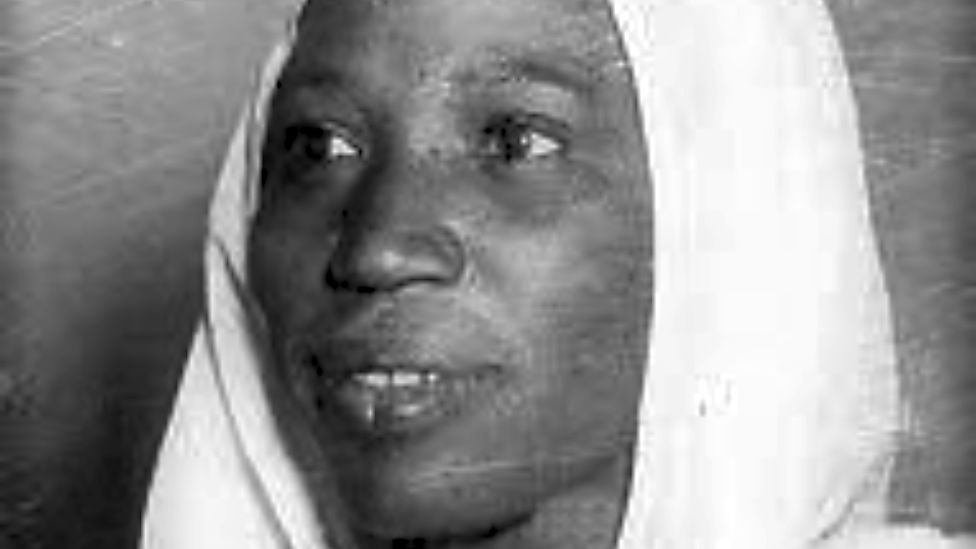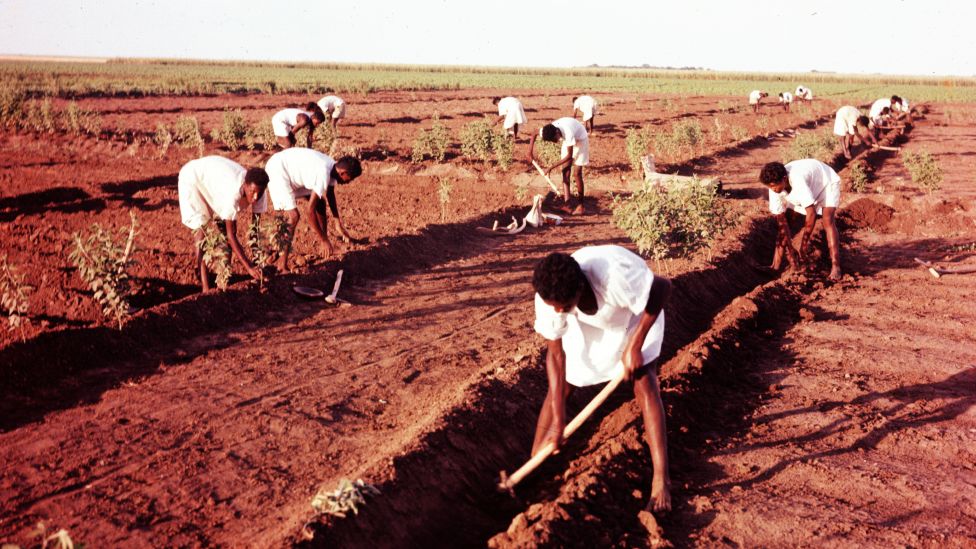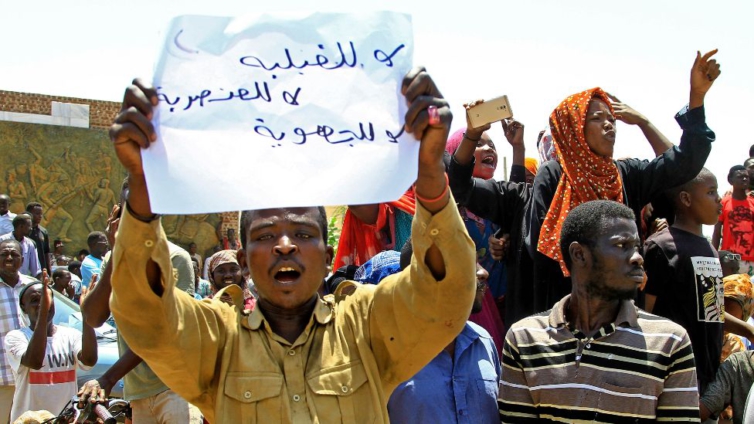A demand by Sudan's Hausa community to be recognised as traditional custodians of some land in Blue Nile state has erupted into deadly violence.
Clashes broke out last weekend with members of another ethnic group that considers itself native to the area.
More than 100 mainly unarmed people were killed and thousands of Hausa have been driven from their homes, prompting angry demonstrations elsewhere in Sudan about their treatment. At least eight people have died in these subsequent protests put down by the police.
Who are the Hausa community?
Originally from West Africa, they have lived in Sudan for centuries, often settling there on the long and arduous land journey to or from Mecca for the Hajj. All Muslims who are able to do so should try to visit the holy city in Saudi Arabia at least once in their lifetime to perform the pilgrimage.
British colonisers in Nigeria were also responsible for the movement of many Hausas eastwards - when they defeated the defiant sultan of the Sokoto Caliphate in 1903, many of his followers and descendants eventually settled in Sudan.

Estimates about their population today vary wildly. At independence in 1956 it was thought to be 500,000 - and now ranges from three to 10 million out of Sudan's more than 44 million residents.
They tend to live and work in central Sudan in agricultural schemes and farms along Sudan's rivers - but most cities around the country have Hausa communities.
Their influence on Sudanese culture cannot be underestimated - and can be smelt at open air markets and eating places across the country. This is because their Agashe dish is a beloved street food: grilled kebabs of beef, lamb or chicken seasoned with spices and peanuts and served with raw onions and lime juice.
The first woman to sing on national radio in Sudan in 1942 was Aisha al-Falatiya, a Sudanese Hausa singer who became hugely popular with her love songs - as well as those with political themes, especially in the run-up to independence. She also toured the continent during World War II entertaining Sudanese troops fighting for the British.
Yet Hausas sometimes find it hard to gain acceptance within Sudanese society.
"The Hausas have long struggled with alienation… and they tired of being called foreigners," says researcher Mohamed Ahmed, an expert on communities in Sudan with West African ties.
Why is there friction?
It is linked to land.
During colonial times, the British created one of the world's largest irrigation schemes between the Blue Nile and White Nile. When the Gezira project started in 1911, slaves were largely used as free labour to mainly grow cotton for the industrial mills of north-west England.

After the British abolished slavery in the region in 1924, Gezira - which today has expanded to an area of more than two million acres (more than 900,000 hectares) - faced a manpower shortage.
According to Mr Ahmed, one solution the colonial administration came up with was to give 3,000 Hausa people land to encourage them to settle - with many of them working on the Gezira scheme.
This allowed a sizeable community of Hausa people to put down more permanent roots.
But right from the start, local groups were unhappy and stipulated that the land could not be handed down to younger generations. This was followed in 1948 with a restrictive citizenship law.
"The Hausas were denied citizenship status based on their ethnicity by the Sudanese authorities with the complicity of the British administration, which resulted in denying them education, and other opportunities," says Mr Ahmed.
With the country's independence eight years later, things did not improve greatly - as a person had to show their great-great grandfather was Sudanese to get citizenship, which many Hausas were unable to do.
This changed for the better in 1994 when Islamist politician Hassan Turabi was speaker of parliament, and ushered in a law that allowed those born in Sudan or had lived in the country for five years to get Sudanese nationality.
But Mr Ahmed says the Hausas still face prejudice from officials who sometimes require a Hausa person to bring four witnesses to swear they are Sudanese - and generally make it difficult for them to get papers.
The trouble last weekend was not the first backlash they have faced. Student protests in the capital, Khartoum, against a peace deal ending a civil war in the south turned violent in 1974. One of those killed by police was a boy from a community with links to West Africa.
It gave rise to the authorities' belief that these communities, including the Hausas, were behind the opposition protests - and some of them were expelled from Khartoum and its twin city Omdurman.
According to Mokhtar Ali, a Hausa resident of Omdurman at the time, several suburbs were targeted with people regarded as foreigners rounded up and put on trains to Nyala in South Darfur and then on to lorries to Adré in eastern Chad.
But the Chadian government refused to allow them passage, which led to a community of Hausas eventually settling in Darfur and other parts of Sudan.
Trouble also erupted in October 2008 when Omar al-Bashir was president.
He was quoted by a paper as saying that the Hausa community was not indigenous to Sudan, leading to protests in which seven died and more than 100 people were wounded. Bashir denied making the comments.
What is behind the current unrest?
It is complicated - and again goes back to land and is also mixed up with political infighting for influence in the state.
Last month, a new governor of Blue Nile granted a Hausa request for their own emirate within the state, which gives them the recognition they want and a say over local affairs.

The move irked the state's main traditional ruler, from the Berta ethnic group - who suggested that the Hausa community get a lower tier of recognition instead, with their leader becoming a mayor or sheikh.
This led to calls on social media to strip Hausa people of their citizenship and their agricultural land - and the new emir was even kidnapped, sparking the recent violence.
Observers say each side is backed by different factions of Blue Nile's SPLM-N movement and former rebel group - one of which recently agreed to give up its arms, while the other still refuses.
The SPLM-N squabbles have left the Hausa community more determined than ever to get the governor to keep his promise and create their emirate.
Such divisions could play into the hands of the country's military leaders - and may even be encouraged by them.
There are fears they are eager to take the steam out of continuing nationwide protests against last October's coup when the army overturned a power-sharing arrangement with civilian groups intended to pave the way to elections next year.
Latest Stories
-
Bawumia’s 8 minutes elite ball that zapped the energy of trigger happy politicians
25 minutes -
It will be a betrayal if National Cathedral saga does not feature in ORAL’s work – Ablakwa
35 minutes -
‘It’s unfortunate we had to protect the public purse from Akufo-Addo’ – Ablakwa on ORAL Team’s mission
1 hour -
Congo lawyers say Apple’s supply chain statement must be verified
2 hours -
Stampede in southwestern Nigerian city causes multiple deaths
2 hours -
Tens of thousands without water in Mayotte as curfew brought in
2 hours -
ORAL: We won’t witch-hunt, we’ll focus on transparency, not revenge – Ablakwa
3 hours -
Attempted robbery: Accused claims he carried cutlass for protection
3 hours -
Excavator operator jailed for stealing
3 hours -
African fans age-shame me for putting on some outfits – Tiwa Savage
3 hours -
Tiwa Savage criticised by female fans for stance on cheating in relationships
4 hours -
Bank of England expected to hold interest rates
4 hours -
Congo river boat sinks killing at least 22
4 hours -
Nigeria approves Shell’s $2.4 billion asset sale to Renaissance
4 hours -
Embattled Liberian speaker questioned by police over parliament fire
5 hours

